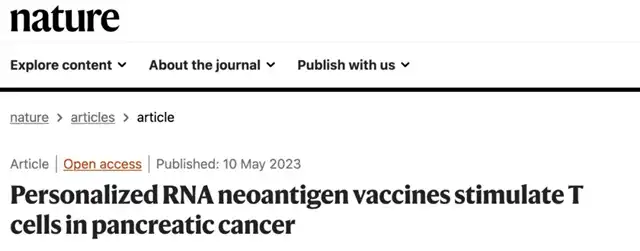Personalized mRNA Vaccine Shows Long-term Immune Response in Pancreatic Cancer Patients
- Normal Liver Cells Found to Promote Cancer Metastasis to the Liver
- Nearly 80% Complete Remission: Breakthrough in ADC Anti-Tumor Treatment
- Vaccination Against Common Diseases May Prevent Dementia!
- New Alzheimer’s Disease (AD) Diagnosis and Staging Criteria
- Breakthrough in Alzheimer’s Disease: New Nasal Spray Halts Cognitive Decline by Targeting Toxic Protein
- Can the Tap Water at the Paris Olympics be Drunk Directly?
Personalized mRNA Vaccine Shows Long-term Immune Response in Pancreatic Cancer Patients
- Should China be held legally responsible for the US’s $18 trillion COVID losses?
- CT Radiation Exposure Linked to Blood Cancer in Children and Adolescents
- FDA has mandated a top-level black box warning for all marketed CAR-T therapies
- Can people with high blood pressure eat peanuts?
- What is the difference between dopamine and dobutamine?
- How long can the patient live after heart stent surgery?
Personalized mRNA Vaccine Shows Long-term Immune Response in Pancreatic Cancer Patients
On April 5, 2024, the highly anticipated 115th American Association for Cancer Research (AACR 2024) Annual Meeting opened in San Diego, USA. As a focus of the cancer research community, scientists, clinical doctors, and cancer researchers from around the world gathered here to share the latest advances in cancer research and treatment.
On April 7, Professor Vinod Balachandran of the Memorial Sloan Kettering Cancer Center presented the latest clinical trial data on a personalized mRNA cancer vaccine, autogene cevumeran (BNT122), for the treatment of pancreatic cancer. The early clinical data of this vaccine was published in Nature in May last year.
This mRNA vaccine expresses up to 20 unique new antigens (Neoantigens) identified from tumors of pancreatic cancer patients. The mRNA vaccine platform enables rapid development, production, and delivery of vaccines without significantly delaying the treatment of rapidly progressing pancreatic cancer.
The latest data shows that the mRNA vaccine has continuously activated T cells in some pancreatic cancer patients for up to 3 years after treatment. The vaccine-induced immune response is associated with a reduced risk of cancer recurrence.
Pancreatic cancer, known as the “king of cancer,” is a highly malignant gastrointestinal tumor that is difficult to diagnose and treat. Pancreatic ductal adenocarcinoma (PDAC) accounts for over 95% of all pancreatic cancers.
Various treatments for PDAC are ineffective, and the recurrence rate is high, partly due to the low mutation rate of PDAC, resulting in few new antigens (Neoantigens) and weak antigenicity of PDAC. However, most PDACs actually contain more new antigens than previously predicted. Therefore, strategies that deliver new antigens to patients may induce new antigen-specific T cells, improving patient prognosis.
On May 10, 2023, Vinod Balachandran, in collaboration with researchers from BioNTech and Genentech, published a research paper titled “Personalized RNA neoantigen vaccines stimulate T cells in pancreatic cancer” in the top academic journal Nature.

The study developed a personalized mRNA vaccine strategy, autogene cevumeran (BNT122), which expresses 20 new antigens from pancreatic ductal adenocarcinoma (PDAC) patients using lipid nanoparticles (LNP) for intravenous administration.
A total of 16 PDAC patients who had undergone surgical resection participated in this clinical trial, receiving the mRNA vaccine in combination with standard therapy (mFOLFIRINOX regimen) and immune checkpoint therapy (anti-PD-L1 monoclonal antibody). Eight patients (50%) showed significant T cell responses, indicating that the personalized mRNA vaccine can induce enhanced immune responses. After 18 months of follow-up, the enhanced immune response in patients was associated with delayed recurrence, while patients who did not respond to the vaccine experienced disease progression a median of 13.4 months after initial assessment.
At the AACR conference, Professor Vinod Balachandran presented the latest data on the personalized mRNA vaccine. After a median follow-up of 3 years, the 8 patients who produced T cell responses remained recurrence-free, significantly longer than the median recurrence-free survival of 13.4 months in the 8 patients who did not produce T cell responses. Furthermore, the personalized mRNA vaccine led to the expansion of multiple CD8+ T cell clones in the 8 patients who produced T cell responses, 98% of which were not present in the blood, tumor, or adjacent tissues before vaccination. Over 80% of the expanded CD8+ T cell clones persisted in the blood long-term, accounting for 0.1% of all blood T cells. In these 8 patients, 6 patients’ CD8+ T cells isolated 3 years after vaccination still responded to target new antigens in in vitro challenge experiments.
Professor Vinod Balachandran concluded that these data suggest that autogene cevumeran can induce long-lived, abundant, and functional CD8+ T cells. This confirms that personalized neoantigen-specific cancer vaccines can induce potent immune responses, which are associated with delayed disease recurrence, further supporting the vaccine as a promising treatment for pancreatic cancer.
He also stated that a randomized phase 2 clinical trial is currently underway to compare the efficacy and safety of autogene cevumeran in combination with standard therapy (mFOLFIRINOX regimen) and immune checkpoint therapy (anti-PD-L1 monoclonal antibody) with standard therapy (mFOLFIRINOX regimen) in resectable pancreatic cancer patients.
The personalized mRNA new antigen vaccine autogene cevumeran (BNT122), developed jointly by BioNTech and Genentech, is currently undergoing 4 clinical trials for the treatment of advanced melanoma (phase 2 clinical), adjuvant treatment of colorectal cancer (phase 2 clinical), treatment of solid tumors (phase 1 clinical), and adjuvant treatment of pancreatic ductal adenocarcinoma (phase 2 clinical).
Personalized mRNA Vaccine Shows Long-term Immune Response in Pancreatic Cancer Patients
References:
https://www.nature.com/articles/s41586-023-06063-y
(source:internet, reference only)
Disclaimer of medicaltrend.org
Important Note: The information provided is for informational purposes only and should not be considered as medical advice.



